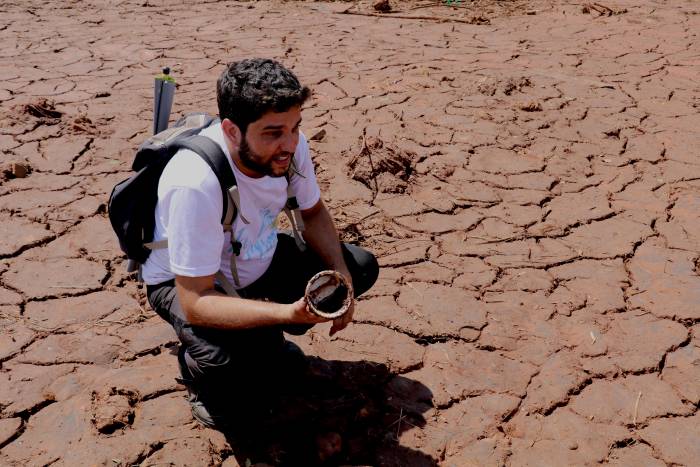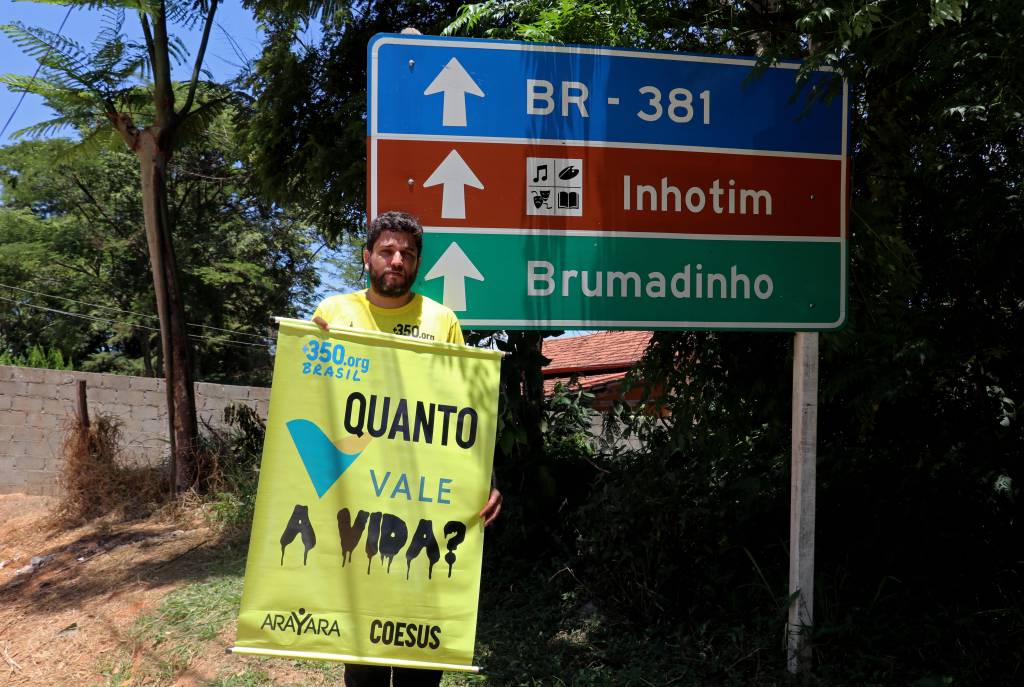On 25th January, the Vale mining dam collapsed, killing at least 150 people according to data released by the mining company, with a further 182 missing.
Environmental manager and campaigner Renan Andrade spent seven days on site assessing the social and environmental impacts of the Córrego do Feijão Mine dam collapse in the town of Brumadinho in Minas Gerais state (MG), as well as providing solidarity to those affected.

Renan Andrade at Brumadinho
You spent about a week in the town and were in contact with people who were directly and indirectly affected by the social and environmental crime in Brumadinho (MG). What is your assessment of the social and environmental situation of the region?
The town’s local economy heavily depends on mining and so many people in the region will significantly suffer from the sudden standstill in the mining activities as a result of the company’s irresponsibility. This will affect as many as 4,000 mining workers, subcontractors, as well as local commerce and suppliers, among others. In other words, entire consumer supply chains will be impacted. Recovery will be slow and will depend on the mobilisation of resources by civil society, and also Vale, who are responsible for the crime, and the government, who contributed to this event happening.
With regards to culture, the loss is irreversible. Hundreds of families lost everything they had – homes, photos, lifestyles – all of which is immeasurable. This will undoubtedly have terrible consequences for the mental health of the victims. Another important factor is that indigenous communities, such as the Pataxós Hã-hã-hãe, living on the banks of the Paraopeba river, lost their main source of subsistence, not only physiological but also cultural, since they depended on the river for rituals that are part of their ancient culture.
And for the environment, the loss is also irreparable. For example, some institutions that have conducted scientific analyses of the Paraopeba river have announced its death. This means thousands of fish are condemned, as well as fishermen who depend on the fish, in addition to the macro and micro invertebrates that maintain biological control of hundreds of vectors, which in a not too distant future could unleash epidemics of controlled tropical diseases.
As for the local flora, the tsunami of contaminated toxic waste destroyed thousands of specimens (tailings). In addition to maintaining hydrological cycles and carbon dioxide capture (Co2) from the atmosphere, these specimens served as ecological corridors. They ensured the gene flow of species and provided shelter for fauna, which in turn play a fundamental role in an ecosystem. When the populations of all this biodiversity spiral out of control, the relative consequences for the soil and climate may be irreversible for family farming – responsible for 70% of all the food that reaches the plates of Brazilian households – and may accelerate climate change.
In your opinion, how can an international non-governmental organisation like 350.org provide support in tragic situations like Brumadinho (MG)?
NGOs have set up an entire support system so that affected local communities are not left in the clutches of governments or companies who are complicit in violating human and environmental rights. They have played a key role – supporting transparency of information, giving voice to the victims and also providing technical, administrative, legal and humanitarian support to local organizations. International NGOs should focus on empowering local organisations in order to collectively build an autonomous and sustainable society. From what I’ve seen in Brumadinho (MG), this has been happening in a very effective way.
Many people are being assisted in the region at the moment, but there are major concerns about what action could be taken in the long run. What can be done so that this event is not forgotten?
It is fundamental to empower local organisations, since at this very moment, the mining company is launching a protocol to stop grassroots acting against their interests. This dismantles socio-environmental movements and co-opts local leadership, thus undermining incorporated struggles. International organisations should stand side by side in the fight with local grassroots organisations – which are and will be demanding appropriate actions from public and company authorities. These organisations include the Water and Serras de Casa Branca Movement (“Movimento Águas e Serras de Casa Branca-Brumadinho“) and Justice on the Rails “Justiça nos Trilhos“. Both organisations have been denouncing Vale’s mismanagement, incompetence, and ineffectiveness throughout the country and abroad for a long time. In short, “nobody lets go of anyone’s hand”.

Campaigners like yourself have been monitoring various socio-environmental crimes and accidents, including those that have received less media coverage (such as the Transpetro leakage, pre-salt oil platforms, and fracking). Is there any difference in the work you carry out in these cases?
There is a difference in the approach. In the case of the Transpetro leakage and Argentinian fracking gas wells, the work is more technical involving site visits and formal complaints, where we understand the scope of the incident and measure the impact on people’s lives and nature in order to later charge the authorities for the social and environmental damages.
In the case of Brumadinho, you have an immeasurable human tragedy. The reports of local victims means we are subjected to a very large and heavy emotional burden. When you see a man sitting by the edge of the sludge and ask him “what are you doing there?”, and he responds “I’m waiting for my son to come up from the mud”, or when you ask a woman “did you lose anyone?” and she answers “yes, my daughter, but for me, she’s still here, as I haven’t seen her body”, it creates a huge difference in the local atmosphere. What can be done in cases like this is to provide solidarity and strength to those who are there, facing the difficulties imposed by the mining company’s irresponsibility.
But you see, from a perspective of socio-environmental impact, Vale, Petrobrás and YPF (in Argentina), are responsible for serious damages regardless of whether a tragedy occurs or not. And I say this because they all begin operating in municipalities through federal grants, without considering the local economy and the population that will be directly affected.
In the case of the Transpetro leakage and the pre-salt oil platforms, the scarcity of fish was already affecting communities long before the leakage happened. When it eventually occurred, the price of the fish fell sharply. The Allen region in Argentina has always traditionally been an area of family farming. Today, however, it is suffering from fracking operations. Farmers are no longer able to export their products to many countries. There there are also many reports of people in the community with serious health problems because of the contamination of local water supplies. We’re talking about people’s lives in each and every case. People’s lives that are affected by these operations. And the question we asked Vale applies to all companies: “How much is life worth? How much are the lives of those affected worth?”
What motivates the organisation, and you as a campaigner, to act?
I’ve been in this line of work for more than 15 years. Perhaps it is because I was born and raised in the countryside of Minas Gerais, in the midst of our rural culture, that I value people as much as I do nature. This feeling grows when injustices are committed and turns into anger, strength and courage to help defend those who cannot defend themselves alone. And 350.org Brasil is an institution made up of qualified professionals, who are concerned with public well being, the autonomy of communities, self-sufficient energy supply, and the fight against socio-environmental injustices. That’s what motivates me to continue in this line of work, since the organisation is aware of the important role it plays in people’s lives, as well as in the search for a healthier, more balanced and fair environment for society as a whole.
—
Interview by Paulinne Rhinow Giffhorn — Journalist at the International Arayara Foundation and the No Fracking Brasil Coalition for Climate, Water, and Life (COESUS).
Email : [email protected]
Telephone numbers: (41)99823-1660 or (41) 3240-1160 (communications)